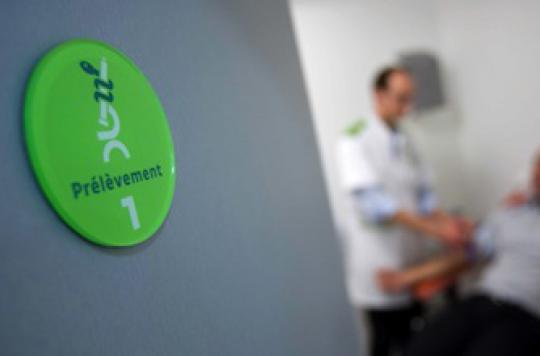Thanks to a new prototype filter, a blood test could improve the diagnosis of tumors. The technique would serve to avoid biopsies, but also to offer the best treatment to the patient.

Will the biopsy soon be replaced by a blood test? Even if it is not for tomorrow, it is in any case the result that Yvon Cayre, professor of hemathology at the Pierre-et-Marie Curie University in Paris, would like to achieve. To do this, he has developed a new prototype cancer cell detection filter that would reveal certain specific characteristics of cancers. All without going through the invasive and sometimes dangerous act that is the biopsy. Its technique is based, in fact, on a simple blood test and a tube fitted with the famous filter. This prototype, the Gustave-Roussy Institute in Villejuif, the leading oncology center in Europe, has agreed to test it from January.
Responsible for this project, the Dr Françoise Farace, director of the circulating cell biology laboratory at IGR, answers questions from why actor.
How does the prototype filter developed by Prof. Yvon Cayre work?
Dr Françoise Farace : With this technique, the blood is passed through a filter. The smallest cells in the blood will pass through the pores. And the larger cells will not be able to pass through the pores. They will therefore remain on the filter. This technique is therefore not based on specific characteristics of tumor cells but only on their size.
This study will start from January-February 2014 at the Institute Gustave Roussy. We will proceed in several stages. First of all, we’re going to take normal blood and put tumor cells in it. If this first phase is successful, we will test the experiment on patient blood.
With this filter, are we in the diagnosis of an existing cancer?
Dr Françoise Farace : This involves looking for a genetic abnormality in circulating tumor cells. We already know that the patient has cancer, the diagnosis has already been made. And what you want to do is just diagnose a genetic defect in these cancer cells. This is very important, because it is the detection of this genetic anomaly that will allow him to be given the right treatment. Let’s be clear, we are not talking about cancer screening at all.
Could this prototype be used for all types of cancer?
Dr Françoise Farace: This prototype will concern all solid tumors. However, it will be more interesting for certain cancers in particular. Among them, lung cancer where it will be of particular use. In this pathology, we often have to deal with multiple genetic abnormalities for which there are specific treatments. This filter can detect them. And in this case, we can then develop the most suitable treatment.
Another example that interests us is that of prostate cancer. In this pathology, we can also detect genetic abnormalities. But unfortunately, there are still no specific treatments for these abnormalities.
Could this prototype also avoid the biopsies that patients fear?
Dr Françoise Farace : This is also the goal indeed. From there to avoid 60% of biopsies with a simple blood? Nothing proves it for the moment, and these remarks only engage Professor Yvon Cayre. Anyway, this study is very encouraging for the future, because theBiopsies are always very delicate for patients and doctors. It is a heavy, invasive examination, which is performed under anesthesia, and which is not without risks. And this in particular in lung cancer. In this pathology, they are often of poor quality, because we do not have a lot of latitude, and sometimes we are not really in the tumor but in the healthy tissue. In this case, the biopsy is not rich enough. For all these reasons, sometimes the diagnosis is unreliable.
.















